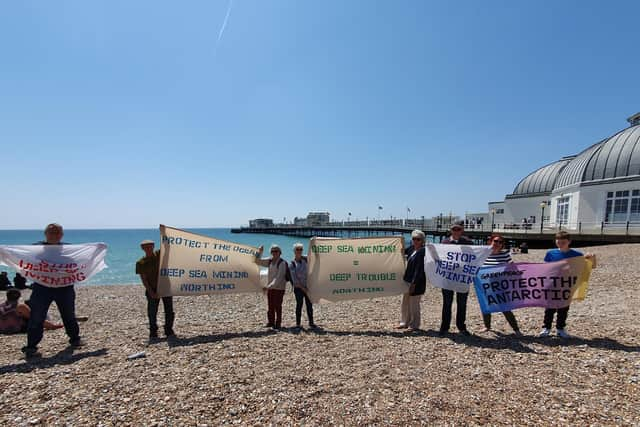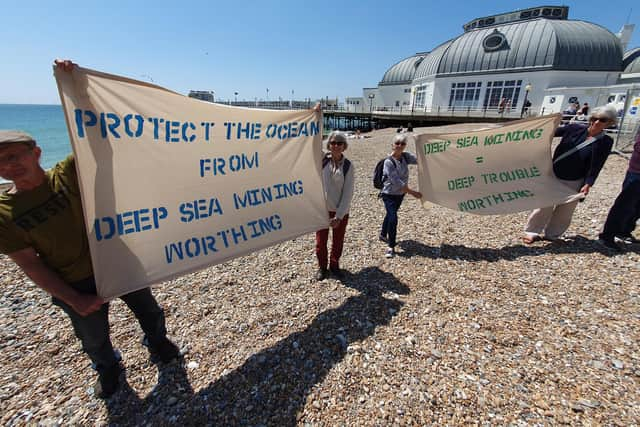Greenpeace volunteers meet on Worthing seafront as part of global protest against deep sea mining
and live on Freeview channel 276
The peaceful protest against the UK Government – by volunteers from Greenpeace Arun and Adur Group – happened on Worthing seafront on Saturday (June 3).
It came ahead of the International Seabed Authority (ISA) meeting on deep sea mining in Kingston, Jamaica next month.
Advertisement
Hide AdAdvertisement
Hide AdRod Thick from Worthing said: “On Saturday, ahead of World Oceans Day, I joined volunteers from Greenpeace Arun and Adur Group to send a message to our MP, Sir Peter Bottomley, and PM Rishi Sunak that they need to take ocean protection seriously, and call for a ban on deep sea mining.


"Deep sea mining would destroy the habitat of fantastic sounding but little-known sea life such as ghost octopus, yeti crab, scaly-foot snail or barreleye fish.”
According to Greenpeace, this global banner protest is the ‘latest step in the campaign to protect our oceans’.
A spokesperson for the local campaign network added: “Throughout May and June, volunteers have been engaging the public through a series of activities to make them aware of what is at stake and to put pressure on the UK government ahead of the ISA meeting in late July.
Advertisement
Hide AdAdvertisement
Hide Ad"One activity challenged local residents to draw what they think one of the deep sea’s little known creatures looks like. These drawings will be delivered to the UK Government to demonstrate that people across the UK do not support plans to strip the ocean floor for profit.


"On May 4 – Star Wars Day – Greenpeace invited the world’s most notorious super villains, Darth Vader, Dr Evil and Thanos, to join other ocean destroyers at the deep sea mining conference in London.”
Campaigners argue that vast areas of the deep ocean floor – ‘one of the last untouched ecosystems on earth’ – would be ‘stripped bare’ by deep sea mining – ‘causing irreversible damage to marine life’.
The spokesperson added: “The UK now sponsors some of the largest areas for deep sea mining exploration, covering 133,000km2 of the Pacific Ocean, through UKSR. That’s an area larger than the size of England.
Advertisement
Hide AdAdvertisement
Hide Ad"But the rest of the world is waking up to the significance of the threat from deep sea mining. As well as leading green tech companies calling for a moratorium, many governments support a pause on deep sea mining.
"Recent months have also seen indigenous advocates reject deep sea mining, scientific warnings of the risks grow ever stronger, and the longest-standing and biggest corporate backer of the industry call it quits. In May, Maersk announced it was jumping ship, becoming the latest big name to divest from deep sea mining.”
Campaigners have called on the government to ‘prioritise resource efficiency’, and a ‘transition to a circular economy’ – whereby resource usage ‘is reduced and metals already in circulation are reused and recycled’.
Mr Thick said: “I don’t want the phone I use, or the chips in my computer to be there as a result of damage to such a precious ecosystem which protects us from climate change and provides livelihoods to people across the world.”
Advertisement
Hide AdAdvertisement
Hide Ad